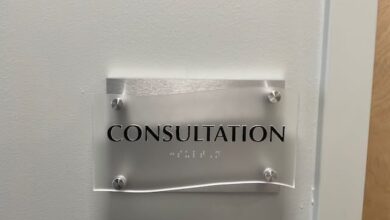Enhance Business Visibility with Exterior Building Signs: A Comprehensive Guide
Exterior building signs are indispensable assets for any business, serving as the first point of contact for customers and a beacon of visibility in the competitive marketplace. This guide explores the pivotal role of exterior signage in bolstering business presence, enhancing brand recognition, and driving customer engagement.
What are Exterior Building Signs?
Definition and Purpose
Exterior building signs are installations placed outside business premises to convey vital information, attract attention, and establish a distinct presence in the community. Their primary function is to captivate passersby, communicate the brand identity, and guide potential customers to the business location.
Types of Exterior Building Signs
Channel Letter Signs
Channel letter signs feature individually formed letters with built-in illumination, offering a sleek and eye-catching display.
Monument Signs
Monument signs are low-profile structures situated at ground level, typically showcasing the business name and logo prominently.
Pylon Signs
Pylon signs are tall, freestanding structures often located near roadways to maximize visibility from a distance.
Dimensional Letter Signs
Dimensional letter signs use raised letters and graphics to create a three-dimensional effect, enhancing visibility and aesthetic appeal.
Benefits of Exterior Building Signs
Enhanced Business Visibility
Exterior signs serve as powerful landmarks that increase business visibility and attract foot traffic, particularly in high-traffic areas.
Brand Recognition and Identity
By prominently displaying logos, colors, and brand messages, signs reinforce brand identity and facilitate instant recognition among consumers.
Increased Foot Traffic and Customer Engagement
Well-designed signs draw attention and intrigue, prompting potential customers to explore the business and engage with its offerings.
24/7 Advertising Presence
Exterior signs operate as continuous marketing tools, promoting the business round-the-clock and reaching a broad audience even during non-business hours.
Designing Effective Exterior Building Signs
Key Elements of Sign Design
Visibility and Contrast
Ensure signs have high visibility through contrasting colors and strategic placement to stand out against backgrounds.
Font and Typography
Choose fonts that are legible from a distance and align with the brand’s personality and message.
Logo and Branding Integration
Integrate the company logo seamlessly into the sign design to reinforce brand identity and memorability.
Size and Placement
Select an appropriate size relative to the building and surrounding environment, ensuring the sign is easily visible and accessible.
Design Tips for Maximum Impact
- Keep the message clear and concise to maximize readability.
- Use high-quality materials and finishes to enhance durability and aesthetic appeal.
- Test the sign’s visibility from different angles and distances to optimize impact.
Choosing the Right Material for Exterior Building Signs
Durability and Weather Resistance
Select materials capable of withstanding outdoor elements, ensuring longevity and minimal maintenance requirements.
Popular Materials Used in Exterior Signage
Aluminum
Aluminum offers durability, lightweight properties, and corrosion resistance, ideal for various weather conditions.
Acrylic
Acrylic provides versatility, allowing for customizable designs and vibrant color options while maintaining durability.
PVC
PVC (Polyvinyl Chloride) is known for its affordability, weather resistance, and suitability for outdoor signage applications.
Composite Materials
Composite materials combine different materials to optimize strength, durability, and aesthetic appeal for exterior signs.
Placement Strategies for Outdoor Building Signs
Optimal Location Selection
Identify strategic locations near roads, entrances, or intersections to maximize visibility and exposure to passing traffic.
Considerations for Visibility and Accessibility
Ensure signs are visible from multiple directions and accessible to pedestrians and drivers for maximum impact.
Lighting and Illumination Options
Utilize lighting solutions such as LED illumination to enhance visibility during nighttime hours and inclement weather conditions.
Compliance with Local Zoning and Sign Regulations
Adhere to local regulations regarding sign size, placement, and lighting to avoid fines and ensure legal compliance.
Illuminated vs. Non-Illuminated Exterior Building Signs
Pros and Cons of Each
Illuminated signs enhance visibility at night but may incur higher operational costs. Non-illuminated signs offer cost-effective solutions with minimal maintenance.
Best Practices for Using Illuminated Signs
Opt for energy-efficient LED lighting and schedule regular maintenance to maximize longevity and minimize operating expenses.
Energy Efficiency Considerations
Choose lighting options that minimize energy consumption while maximizing visibility and maintaining environmental sustainability.
Maintaining Your Exterior Building Signs
Regular Cleaning and Maintenance
Implement a routine maintenance schedule to clean signs, inspect for damage, and ensure optimal performance and appearance.
Inspecting for Damage and Wear
Regularly check signs for weather damage, fading, or structural issues, promptly addressing any maintenance needs to prolong their lifespan.
Updating and Refreshing Signage
Periodically update signs to reflect changes in branding, messaging, or promotions, ensuring relevance and maintaining customer engagement.
Case Studies of Successful Exterior Building Signage
Real-World Examples
Explore case studies of businesses that have effectively utilized exterior building signs to enhance visibility and attract customers.
Analysis of Their Impact and Effectiveness
Evaluate the design strategies, material choices, and placement tactics that contributed to the success of these signage implementations.
Frequently Asked Questions (FAQs)
Q1: What are the most effective types of exterior building signs?
Channel letter signs, monument signs, pylon signs, and dimensional letter signs are highly effective due to their visibility and impact.
Q2: How do I choose the right size for my outdoor building sign?
Consider viewing distance, traffic flow, and surrounding environment to determine the optimal size for maximum visibility.
Q3: What materials are best for durable outdoor signage?
Materials like aluminum, acrylic, PVC, and composite materials are preferred for their durability and weather resistance.
Q4: How can I ensure my sign complies with local building codes?
Consult local authorities and zoning regulations to understand requirements for sign size, placement, and illumination.
Q5: What are the benefits of illuminated signs for businesses?
Illuminated signs increase visibility at night, attract attention, and reinforce brand presence, enhancing overall marketing effectiveness.
Conclusion
Exterior building signs play a pivotal role in enhancing business visibility, reinforcing brand identity, and attracting customers. By leveraging strategic design, appropriate materials, and thoughtful placement, businesses can maximize the impact of their signage investment. Investing in effective exterior building signs is not just about aesthetics but a critical component of successful marketing and brand communication strategies.




